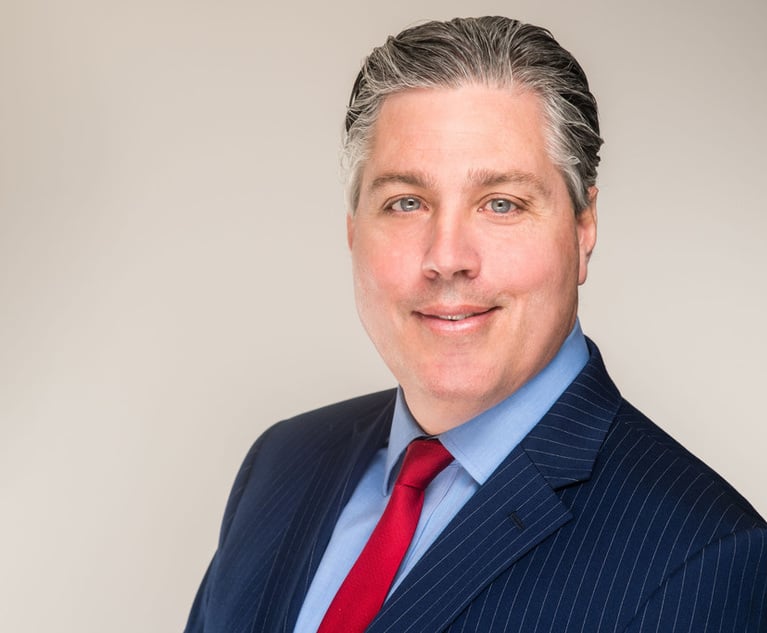Companies Settle With Paralyzed Oilfield Worker for $44M
An oilfield worker who was rendered quadriplegic after a light fixture improperly attached to an oil derrick fell more than 100 feet onto his head has settled his claims against five companies for a total of $44 million.
November 27, 2018 at 04:42 PM
5 minute read
 (Photo: TebNad – Fotolia)
(Photo: TebNad – Fotolia)
An oilfield worker who was rendered quadriplegic after a light fixture improperly attached to an oil derrick fell more than 100 feet onto his head has settled his claims against five companies for a total of $44 million.
The multimillion-dollar award is meant to compensate the injured plaintiff, James Burgess, and his wife, Kay Sharon Burgess, who live in rural Texas. The case, which was filed in the Philadelphia Court of Common Pleas, came to a settlement after two days of mediation before retired federal magistrate Judge Diane Welsh.
“Mrs. Burgess's loss of consortium claim was probably the most significant consortium claim anyone in the case had ever encountered,” Sheridan & Murray attorney Thomas Sheridan, who represented the Burgesses, said. “Her husband is in a hospital over 90 miles away from her house. She drove to the hospital every day for the last six years to see her husband.”
According to court papers, James Burgess was working on a drill rig owned and operated by Patterson Drilling Services in December 2012. A four-foot LED light designed by Dialight fell 103 feet onto Burgess' head, causing a neck fracture that compressed his spinal cord and rendered him permanently quadriplegic.
The Burgesses sued Dialight, which designed and marketed the light; National Oilwell Varco, which designed and manufactured the rig's component parts; Clark Electrical Contractors, the company that installed the light; Cabot Petroleum North Sea Ltd., which owned the mineral rights of the oil; and Patterson.
According to Burgess' pretrial memo, Dialight did not manufacture the light for use on drill rigs, but the company still marketed the lights to the oil and gas industry for use on rigs. Specifically, the memo said the fixtures lacked anchors that would allow it to be properly attached to safety cables.
Burgess also contended that Clark Electrical Contractors knew the lights were not designed for use on oil drills, but installed them anyway, without the proper safety cables. Burgess' memo further contended that National Oilwell Varco, which made the rig, should have included warning signs or instructions saying that all light fixtures needed to be secured to the drill rig with safety cables for secondary retention.
Patterson, Burgess argued in his memo, also failed to perform safety inspections that would have found that the lights were not properly affixed to the rig. He further alleged that two inspection reports falsified information by certifying that safety cables had been installed, even though they had not been.
Burgess' memo also noted that about 90 minutes before the accident, the electrician who installed the lights noticed one had been knocked loose and was hanging from its power cable. A worker from Cabot stopped work on the rig and the light was removed, the memo said. Burgess contended that, since the loose light had not been attached with a safety cable, Cabot should have done a full inspection of the lights.
The Burgesses raised strict liability and negligence claims against the defendants.
According to court papers, all defendants contested liability.
Clark contended that the other defendants were comparatively at fault, and that the company owed no duty of care to Burgess. National Oilwell Varco contended it had no knowledge about the allegedly defective light, and that improperly attaching the light was the superseding cause of the accident.
Dialight, according to court papers, denied that the product was defective, and contended there was comparative negligence on behalf of the other parties. Cabot denied that it owned, or controlled the drilling site, and argued that Burgess' suit was barred under the statutory employer doctrine. Patterson also raised the statutory employer defense, and contended that Burgess had assumed the risk.
Sheridan, who handled the case with Neil Murray and Frank Mangiaracina, said that, with multiple theories of liability and considerations stemming from the Fair Share Act, the case was extremely complex.
With the defendants pushing to have the case handled in Susquehanna County, venue was also hotly disputed, Sheridan said, adding that discovery was also so contested the court appointed former Philadelphia Judge Mark Bernstein as a special master to handle discovery disputes.
“The saddest aspect of the case is that this industrial accident was entirely preventable,” Sheridan said.
James Doherty of Scanlon, Howley & Doherty, who represented Clark, did not return a call for comment. Dialight was represented by White and Williams attorney Robert Devine, who also did not return a call for comment. Jackson Kelly attorney Michael Leahey represented Cabot. He referred comment to the company's in-house attorney, Cole DeLancey, who also did not return a call for comment.
When reached for comment, Andrew Weinstock of Duplass Zwain Bourgeois Pfister Weinstock & Bogart, who represented National Oilwell Varco, said, “NOV did not sell, design, manufacture or install the allegedly defective product. NOV reached the settlement to avoid continuing litigation expenses.”
This content has been archived. It is available through our partners, LexisNexis® and Bloomberg Law.
To view this content, please continue to their sites.
Not a Lexis Subscriber?
Subscribe Now
Not a Bloomberg Law Subscriber?
Subscribe Now
NOT FOR REPRINT
© 2025 ALM Global, LLC, All Rights Reserved. Request academic re-use from www.copyright.com. All other uses, submit a request to [email protected]. For more information visit Asset & Logo Licensing.
You Might Like
View All
Saul Ewing Loses Two Partners to Fox Rothschild, Marking Four Fla. Partner Exits in Last 13 Months
3 minute read


Feasting, Pledging, and Wagering, Philly Attorneys Prepare for Super Bowl
3 minute readTrending Stories
- 1States Accuse Trump of Thwarting Court's Funding Restoration Order
- 2Microsoft Becomes Latest Tech Company to Face Claims of Stealing Marketing Commissions From Influencers
- 3Coral Gables Attorney Busted for Stalking Lawyer
- 4Trump's DOJ Delays Releasing Jan. 6 FBI Agents List Under Consent Order
- 5Securities Report Says That 2024 Settlements Passed a Total of $5.2B
Who Got The Work
J. Brugh Lower of Gibbons has entered an appearance for industrial equipment supplier Devco Corporation in a pending trademark infringement lawsuit. The suit, accusing the defendant of selling knock-off Graco products, was filed Dec. 18 in New Jersey District Court by Rivkin Radler on behalf of Graco Inc. and Graco Minnesota. The case, assigned to U.S. District Judge Zahid N. Quraishi, is 3:24-cv-11294, Graco Inc. et al v. Devco Corporation.
Who Got The Work
Rebecca Maller-Stein and Kent A. Yalowitz of Arnold & Porter Kaye Scholer have entered their appearances for Hanaco Venture Capital and its executives, Lior Prosor and David Frankel, in a pending securities lawsuit. The action, filed on Dec. 24 in New York Southern District Court by Zell, Aron & Co. on behalf of Goldeneye Advisors, accuses the defendants of negligently and fraudulently managing the plaintiff's $1 million investment. The case, assigned to U.S. District Judge Vernon S. Broderick, is 1:24-cv-09918, Goldeneye Advisors, LLC v. Hanaco Venture Capital, Ltd. et al.
Who Got The Work
Attorneys from A&O Shearman has stepped in as defense counsel for Toronto-Dominion Bank and other defendants in a pending securities class action. The suit, filed Dec. 11 in New York Southern District Court by Bleichmar Fonti & Auld, accuses the defendants of concealing the bank's 'pervasive' deficiencies in regards to its compliance with the Bank Secrecy Act and the quality of its anti-money laundering controls. The case, assigned to U.S. District Judge Arun Subramanian, is 1:24-cv-09445, Gonzalez v. The Toronto-Dominion Bank et al.
Who Got The Work
Crown Castle International, a Pennsylvania company providing shared communications infrastructure, has turned to Luke D. Wolf of Gordon Rees Scully Mansukhani to fend off a pending breach-of-contract lawsuit. The court action, filed Nov. 25 in Michigan Eastern District Court by Hooper Hathaway PC on behalf of The Town Residences LLC, accuses Crown Castle of failing to transfer approximately $30,000 in utility payments from T-Mobile in breach of a roof-top lease and assignment agreement. The case, assigned to U.S. District Judge Susan K. Declercq, is 2:24-cv-13131, The Town Residences LLC v. T-Mobile US, Inc. et al.
Who Got The Work
Wilfred P. Coronato and Daniel M. Schwartz of McCarter & English have stepped in as defense counsel to Electrolux Home Products Inc. in a pending product liability lawsuit. The court action, filed Nov. 26 in New York Eastern District Court by Poulos Lopiccolo PC and Nagel Rice LLP on behalf of David Stern, alleges that the defendant's refrigerators’ drawers and shelving repeatedly break and fall apart within months after purchase. The case, assigned to U.S. District Judge Joan M. Azrack, is 2:24-cv-08204, Stern v. Electrolux Home Products, Inc.
Featured Firms
Law Offices of Gary Martin Hays & Associates, P.C.
(470) 294-1674
Law Offices of Mark E. Salomone
(857) 444-6468
Smith & Hassler
(713) 739-1250





